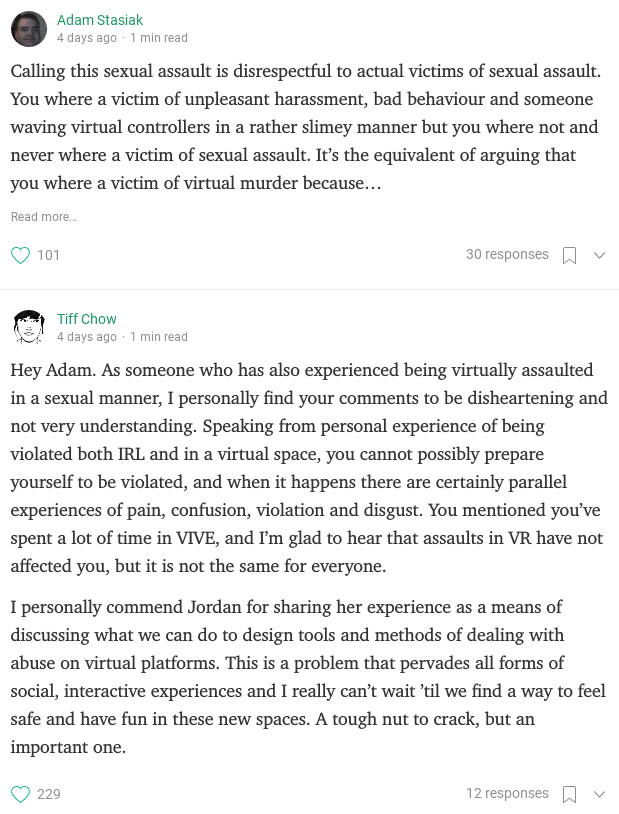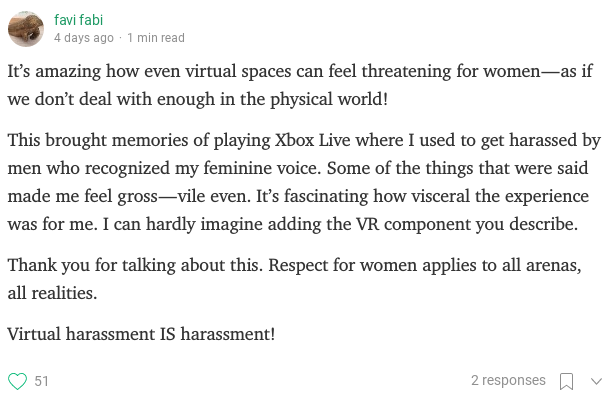This Woman's Experience Shows a Major Problem Facing Virtual Reality

By:
One woman's written account of experiencing sexual assault in Virtual Reality (VR) has started a complex discussion about consent and harassment in this increasingly popular realm.
 Medium - medium.com
Medium - medium.com
Writer Jordan Belamire (who according to CNN Money goes by a pseudonym for privacy purposes) wrote in a recent Medium post that a male real-time player groped her during the game QuiVr. Belamire wrote that she "must have laughed from the embarrassment and the ridiculousness of the situation," as women "are supposed to be cool, and take any form of sexual harassment with a laugh." But this only encouraged the real-time player to taunt and bother her more. Less than three minutes into the multi-player game, she quit as a result of the harassment, which she hasn't been able to stop thinking about:
"Now that the shock has mostly worn off, I’m faced instead with the residual questions about the unbridled misogyny that spawns from gaming anonymity. It’s easy to dismiss the most egregious offenses as the base actions of a few teenage boys, but I don’t think it’s as rare as a few bad apples. How could it be, when my brother-in-law has played multi-player mode a hundred times without incident, but my female voice elicited lewd behavior within minutes? As VR becomes increasingly real, how do we decide what crosses the line from an annoyance to an actual assault? Eventually we’re going to need rules to tame the wild, wild west of VR multi-player. Or is this going to be yet another space that women do not venture into?"
Belamire told CNN Money in a follow-up interview that she has been groped in real life, and that the "shock and disgust [she] felt [in QuiVr] was not too far off from that."
Critics told Belamire that her post seemed insensitive to victims of sexual assault that happened in real life; the backlash prompted her to suspend her Twitter account, she told CNN Money. But Belamire isn't alone. Several women responded to her story by revealing their own horrors of enduring VR sexual assault and gender-based harassment during gaming:
 Medium - medium.com
Medium - medium.com
 Medium - medium.com
Medium - medium.com
QuiVr developers Aaron Stanton and Jonathan Schenker wrote, what Belamire called a "compassionate, respectful, and eloquent" response at Uploadvr.com announcing fixes:
"So, we would like to float a possible way of thinking for the VR development community to consider as we grow. It consists of two parts. One, that we should strive to prevent harassment from happening in the first place, of course. But second, when harassment does happen – and I see no way to prevent it entirely so long as multiplayer experiences exist – we need to also offer the tools to re-empower the player as it happens.
Why experiencing abuse in VR can be damaging in real life.
Dr. Albert "Skip" Rizzo, the director of Medical Virtual Reality at the University of Southern California's Institute for Creative Technologies, told ATTN: over the phone that Belamire's feelings are valid:
"We're very fond of saying that people suspend disbelief when they're in a virtual environment, and we always say that when we're talking about doing it for good entertainment, or in my area, for clinical purposes. We accept that VR can create positive entertaining experiences and also positive healthful or educational experiences. I don't think we can draw a line when it comes to people [saying] well, it's real enough that people feel considerable discomfort when they're violated. When you're in a virtual world and you're really engaging with it as if it's a real thing, to have some ignorant troll harassing you can have an impact. I don't think anyone [in their] right mind that knows anything about the technology and its impact on how people interact and behave in the world should deny that."
Dr. Rizzo noted recent examples of online bullying-related suicides to show that computer-based and virtual activity can have a real impact on people.
"Why is it any different if somebody transduces a physical action through an interface that creates a virtual experience that upsets people?" he said. "It's real easy to say, 'Oh, it didn't really happen.' Well a lot of things happen that have impacts on people, whether it's words, digital, or virtual representation. I think it's grossly insensitive and ignorant to take that kind of position. That's my personal view as someone who tries to leverage the impact of the virtual world for healing."
He said that the first step to preventing assault in VR would be to add safeguards into the environments so there is a digital record of user behavior. Dr. Rizzo added that there might be more layers of complication in the future if VR develops touch capability:
"At some point people will have a breakthrough in haptic interaction where you can hug your loved one from around the world in a virtual environment and get a simulated hug. Well that's a good thing. But a simulated grabbing of your genitals by a stranger? What the fuck?"
These issues in VR point to a larger conversation surrounding the treatment of women in the gaming world.
Gaming culture has been criticized for years for its depictions of violence and treatment of women. "Grand Theft Auto III," for example, sparked controversy when it was released in 2001 for allowing users to have sex with and murder prostitutes. Australia proceeded to ban "Grand Theft Auto III."
A female gamer named Samantha Puglsey wrote in a 2014 piece for xoJane that she couldn't bring herself to play "Grand Theft Auto V" because of its treatment of women:
"I certainly don't want to watch a prostitute service an alpha male playable character only to have him beat her over the head with a baseball bat after the deed is done. Let's not forget one of the newest features of GTA V: The ability to kill all topless women, not just prostitutes. And if that's not enough, it's possible to take a picture of their naked corpses on your camera phone afterward for further misogynistic enjoyment."
Anita Sarkeesian, who started the organization Feminist Frequency to make feminism more accessible, famously received a lot of attention in 2012 for her YouTube series "Tropes vs. Women in Video Games," which is meant to explore gender roles in gaming. This prompted a lot of harassment against Sarkeesian, who, along with others, was targeted in Gamergate.
